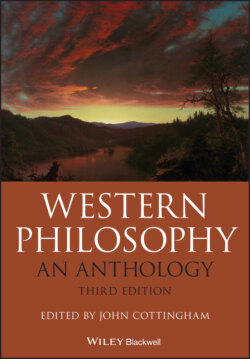Читать книгу Western Philosophy - Группа авторов - Страница 67
The idea of a transcendental logic
ОглавлениеOur knowledge springs from two fundamental sources of the mind; the first is the capacity of receiving representations (the ability to receive impressions), the second is the power to know an object through these representations (spontaneity in the production of concepts). Through the first, an object is given to us; through the second, the object is thought in relation to that representation … Intuition and concepts constitute, therefore, the elements of all our knowledge, so that neither concepts without an intuition in some way corresponding to them, nor intuitions without concepts, can yield knowledge. Both may be either pure or empirical. When they contain sensation (which presupposes the actual presence of the object) they are empirical. When there is no mingling of sensation with the representation, they are pure. Sensation may be called the material of sensible knowledge. Pure intuition, therefore, contains only the form under which something is intuited; the pure concept only the form of an object in general. Pure intuitions or pure concepts are possible only a priori; empirical intuitions and empirical concepts only a posteriori.
If the receptivity of our mind, its power of receiving representations in so far as it is in any way affected, is to be called ‘sensibility’, then the mind’s power of producing representations from itself, the spontaneity of knowledge, should be called ‘understanding’. Our nature is so constituted that our intuitions can never be other than sensible; that is, it contains only the mode in which we are affected by objects. The faculty, on the other hand, which enables us to think the object of sensible intuition is the understanding. To neither of these powers may a preference be given over the other. Without sensibility, no object would be given to us; without understanding, no object would be thought. Thoughts without content are empty; intuitions without concepts are blind. It is therefore just as necessary to make our concepts sensible, that is, to add the object to them in intuition, as to make our intuitions intelligible, that is to bring them under concepts. These two powers or capacities cannot exchange their functions. The understanding can intuit nothing, the senses can think nothing. Only through their union can knowledge arise …
